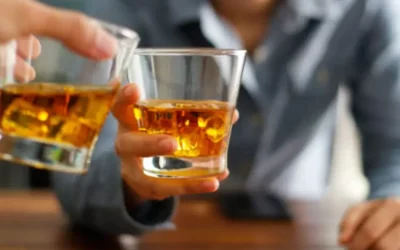Content
This is because distilled, dark-colored drinks like whiskey, bourbon, and brandy contain large amounts of congeners. Preventing dehydration means your hangover symptoms will be much less severe, if you have any at all. But light exercise can help your body speed along its metabolic processes, ridding your body of alcohol and related toxins more quickly. Just make sure you stay hydrated since your body is already battling the effects of dehydration while you’re hung over. A 2014 study from the Center for Weight and Health at UC Berkeley found that fitness drinks like Gatorade were better for quick hydration after intense exercise. So they may get you hydrated faster than regular water after a night of drinking.
Can I take ibuprofen after drinking?
Combining ibuprofen and alcohol can raise the risk of gastrointestinal (GI) bleeding and stomach ulcers. GI bleeding is bleeding that happens in your digestive tract. A stomach ulcer (peptic ulcer) is a sore in the lining of your stomach or the beginning of your small intestine.
Therefore, if ADs are definitely confirmed a common trigger of various primary headaches, some of which with phenotypic overlap, it is more plausible that they act probably at a common central cortical or subcortical levels. If you develop a cocktail headache, stop drinking alcohol and go someplace where you can rest comfortably. Drink lots of water to rehydrate your body and help flush the alcohol from your system. After a night on the town, it’s easy to blame a headache on too much alcohol. But if you’re prone to migraine headaches, drinking even a small amount of alcohol can bring on an attack. 2021 research also linked lifestyle factors with alcohol drinking and smoking to cluster headaches and their severity.
Sulfites in Alcohol: Are There Any Drinks Without Sulfites?
However, alcohol potently inhibited, in itself, diamine oxidase and may activate the release on histamine from mast cells. In conclusion, no significant association between alcohol consumption with migraine and tension headache was found in many studies [26, 28–30]. Beer, on the other hand, may be a safer choice of alcohol than red wine.
- Additionally, alcohol consumption decreases the level of B vitamins in the body, which can make headaches worse.
- Be sure to talk with your healthcare provider about your “cocktail headache” plan.
- However, in some countries, the occurrence of alcohol as headache trigger is negligible, perhaps determined by alcohol habits.
- For people with migraine, alcohol can trigger an attack anywhere from 30 minutes to three hours after consumption, according to the American Migraine Foundation.
- As mentioned above, B vitamins such as B6 and B12 can also be helpful after drinking, and pain medication should be used sparingly and with caution.
- Although, as we’ll discuss below, there are other factors that can lead to headaches no matter what form of alcohol you consume.
Don’t listen to all the weird, outlandish recipes that are purported to help “cure” a hangover. Ingredients like raw eggs, spices, and the numerous preservatives used in processed or fast foods can make symptoms like nausea and vomiting worse. Combined with alcohol, NSAIDs can increase your risk of stomach bleeding. For pain relief, you can take a non-steroidal anti-inflammatory drug (NSAID) such as Advil or Motrin (both are brands of ibuprofen) or Aleve (naproxen), although when combined with alcohol, these can put you at risk of stomach bleeding.
Sulfites
Search terms of “alcohol,” “wine,” “food trigger,” “dietary trigger,” “migraine,” “headache” were used. Additional sources were identified via manual search of bibliographies, references lists, and previous peer reviews. Original studies were selected if they reported in the results a numeric percentage of headache patients referring any ADs as a trigger factor. Other studies useful for the correlation of the results with the pathogenesis of the primary headaches where also selected. The mechanism through which alcohol can trigger these distinct headache disorders is not well understood.

While data on MO and CH are well delineated, those in MA and TH are discordant. There are sparse reports that ADs are also triggers of less frequent types of primary headache such as familial hemiplegic migraine, hemicrania continua, and paroxysmal hemicrania. However, in some countries, the occurrence of alcohol as headache trigger is negligible, perhaps determined by alcohol habits. The frequency estimates vary widely based on the study approach and population.
Cluster headache
Maybe one drink is fine, but two or more starts to make you dizzy, lightheaded, and leads to a splitting headache the next day. Some drinks can contain up to 36 grams of sugar for a 20-ounce serving. The best way to avoid a hangover headache is to limit how much alcohol you drink in one sitting. Still, we’ve also got some tips that can help you reduce your chances of having a headache, and a few to ease your pain in case you’ve already got one. It’s well known that drinking too much alcohol can cause a variety of symptoms the next day. There has been some research into the effect alcohol has in increasing blood flow to certain parts of the brain, but whether this causes or relieves headache symptoms depends largely on the type of headache.
What happens on day 4 of no alcohol?
However, by day 4 without alcohol, most people will have got beyond any initial withdrawal symptoms. All the alcohol will have left your system by now, and your body will begin to bounce back. If you're not as focused on alcohol, you may be eating better, drinking water, moving more, and perhaps sleeping more deeply.
Triptans work best when you take them at the early signs of a migraine. People can talk with their doctors about possible methods to prevent or ease alcohol-induced headaches. However, the research suggests that alcohol may not be the only trigger and may also depend on other factors. More research will help to determine the effects of specific alcohol content on a person’s headaches. This leads to excessive urination and dehydration, which may cause a headache after a small amount of alcohol. In a 2017 study, researchers found that people of East Asian ancestry drink less than members of other groups.
What’s the best way to treat a migraine headache from alcohol?
Alcohol-free red wine polyphenol extract increases endothelial NO release [64]. However in vivo studies show that only the ingestion of red wine with alcohol, but not of dealcoholized red wine, provokes arterial dilatation and thus the effect of wine is due to ethanol [65]. Also oral intake of pure alcohol (at a dose corresponding to a two drink equivalent) produces significant vasodilatation in man [66]. Sulphites have not been shown convincingly to lead to headache in individuals with sulphite sensitivity. Sulphites are considered to be the cause of red wine intolerance, particularly asthma [51]. Nevertheless, other studies have confirmed the sensitivity to the sulphites in wine in limited number of individuals, and in wine-sensitive asthmatic subjects there was no major role for sulphite additives in inducing asthmatic response [52,53].

Others consider an evaluation period of 6 [12] or 24 h [13], while some affirm that headaches appear frequently the next morning/day [10, 14]. Quantity is definitely a factor in whether drinking alcohol will trigger a headache, and the quality of alcohol probably plays a role as well. We do not know for sure, though, how any specific type of alcoholic beverage will affect people with migraine. While some people do experience migraine headaches after drinking alcohol, not everyone does. Congeners are byproducts of alcohol being fermented or distilled, and they impart the specific tastes and flavors that make each beverage unique. These congeners also have a variety of effects that can trigger migraine, alter other chemicals in the body, and induce the hangover effect if consumed in excess.
Can you cure a hangover headache?
Drinking these clear spirits straight, with ice, or mixed with soda water may allow headache sensitive people to enjoy more drinks before a headache is triggered. The type of alcohol being consumed can determine how little is needed to cause a headache. This is because ingredients and additives used in alcohol production can trigger headaches. Generally speaking, a cocktail headache is usually a pulsating or throbbing pain and a hangover headache is more related to fatigue and a general feeling of being run down. I have met people whose headaches result from just the smell of a beer and others whose headaches occur only after drinking a case of beer.
But if you’re prone to migraine headaches, you’ll need to be careful about how much you drink. A 5-ounce glass of wine (or 12 ounces of beer or a 1.5-fluid-ounce shot) may be OK every now and then, so long as it doesn’t bring on a headache. If it does, you’ll need to drink less or stay away from all https://ecosoberhouse.com/article/alcohol-and-headaches-why-does-alcohol-cause-migraines/ alcohol. Staying hydrated and keeping alcohol consumption to a minimum can decrease the chance of experiencing a headache. Individuals who experience severe headaches after drinking alcohol may also avoid alcohol altogether. Alcohol and sugar, when combined, can have a big impact on the human body.
What is a Wine Headache?
This chemical is a vasodilator, which increases the size of blood vessels in the body. One of the main chemicals in wine that causes headaches for some people are the tannins. Tannins are the naturally occurring compounds in the skin of the grapes which help create that dry feeling in your mouth. The higher the concentration of tannins, typically the drier the wine is going to be. While there is no definitive answer to whether eating before drinking wine can prevent headaches, there is some evidence to suggest that it may help. Tannins can also be found in tea, coffee, dark chocolate, and berries.
Why do I get headache after 1 beer?
Alcoholic beverages include a chemical known as ethanol. This chemical is a vasodilator, which increases the size of blood vessels in the body. Vasodilation may trigger migraine attacks in certain individuals. This is especially true for people prone to headaches or migraine without alcohol.
Making sure to drink plenty of water during and after alcohol consumption can decrease the chance of headaches. We’ve all experienced that blistering headache that can happen after a night of drinking wine, but why do some wines give you a headache when others don’t? And why does the headache sometimes happen while drinking, and other times it happens the next morning. These cycles make many in recovery concerned, especially when they have just seen the alcohol withdrawal headaches get better finally, only to return with a new cycle of symptoms. The worst thing you can do is worry and increase your anxiety by thinking that there is something severely wrong with you.
Antihistamines or Anti-inflammatories for a Wine Headache
However, if you are allergic to sulfites, then you are more likely to struggle with breathing and respiratory problems as they are known to cause allergic reactions such as wheezing, coughing, hay fever, and hives. If you do not experience these symptoms while drinking 1 to 2 glasses of a sweet white wine or champagne, then you are probably not sensitive to sulfites. You must then look to other wine components that are causing your side effects.
